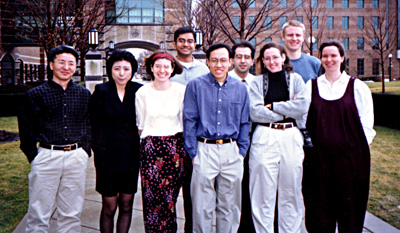|

Saturday, January 23, 1999
8:30 am - 1:30 pm
1005 Beckman Institute
8:30 - 8:50: Registration and refreshments
8:50 - 9:00: Introductions and Introductory Remarks
9:00 - 9:40: Ronald W. Hart, PhD, National Center for Toxicological Research, Food and Drug Administration, Jefferson, Arkansas "Influencing Carcinogenicity/Anticarcinogenicity by Overnutrition and Caloric Restriction" ABSTRACT BELOW.
9:40 - 10:00: Ying Huang (Advisor: Professor J. Katzenellenbogen)
Introduced by Inho Choi
10:00 - 10:20: Karen A. Topp (Advisor: Professor O'Brien)
Introduced by Ying Huang
10:20 - 10:40: Inho Choi (Advisor: Professor B. Katzenellenbogen)
Introduced by Karen Topp
10:40 - 11:00: Babak Behnia (Advisor: Professor Webb)
Introduced by Michael Aref
11:00 - 11:15: Break
11:15 - 11:35: Rachel Konda-Sundheim (Advisor: Professor Clarkson)
Introduced by Babak Behnia
11:35 - 11:55: Ramji Rajendran (Advisor: Professor B. Katzenellenbogen)
Introduced by Rachel Konda-Sundheim
11:55 - 12:15: Kara C. Sorensen (Advisor: Professor Kitchell)
Introduced by Ramji Rajendran
12:15 - 12:35: Joseph Tan (Advisor: Professor Frizzell)
Introduced by Kara C. Sorensen
12:35 - 12:55: Michael Aref (Advisor: Professor Wiener)
Introduced by Joseph Tan
12:55 - 1:00: Closing Remarks
1:00: Light Lunch
Ronald W. Hart, PhD
National Center for Toxicological Research
Food and Drug Administration
Jefferson, Arkansas
"Influencing Carcinogenicity/Anticarcinogenicity by Overnutrition and Caloric Restriction"
Carcinogenicity is characterized by a set of complex endpoints,
which appear as a series of molecular events. Many of these
events can be modified by caloric intake. Since most of these
processes determine an organism's ability to cope with various
environmental stressors, it is not surprising that a relationship
(in the presence of a constant nutrient density) exists between
caloric intake and time to tumor. Our studies have clearly shown
that the greater the body weight (generally in rodents directly
related to extent of caloric intake) the higher the incidence
of spontaneous tumor occurrence, the greater the susceptibility
to chemical carcinogens and the shorter the life span. We have
focused our attention on the questions of how and to what extent
does caloric intake modify those homeostatic processes believed
to be critical in determining the ability of an organism to cope
with endogenous and exogenous stress such as chemical, physical
and biological carcinogens.
The response of an organism can be classified into four (4)
categories - physiological, metabolic, molecular and cellular.
We have found, from a physiological perspective, that body
temperature in rodents is decreased by 0.5 to 1.8 C, while
water consumption is increased by 40 to 80% as is running
activity, however, metabolic output per gram of lean body
mass is not altered, with decreasing caloric intake. Reproductive
capacity declines whereas the ECG waveform is preserved as caloric
intake is decreased. Alterations in these and other physiological
functions suggests that energy intake serves as a signal to up-regulate
or down-regulate functions related to the flight or fright response
observed in placental mammals.
A number of key metabolic pathways are altered as a function of
caloric intake despite the observation that food consumption per
gram lean body mass remains similar due to decreased body weight
with decreased caloric intake. Pharmacological compartmentalization,
however, is altered. As caloric intake declines, changes occur in
the expression of a number of drug metabolizing enzymes, with the
most striking effect being seen on sex-specific, growth-hormones
dependent liver enzymes. Additionally, oxidation stress (free radical
production) appears to decrease as a function of caloric intake and
antioxidant activity increases concurrent with an up-regulation in
the activity of a number of key enzymes of intermediary metabolism.
A number of molecular processes also change with changes in energy
consumption. Our studies have shown that regardless of the source
of DNA damage, DNA repair is preserved and/or enhanced as caloric
consumption decreases. In addition, the fidelity of DNA replication
increases and oncogene expression is stabilized, P53 gene expression
is increased as a function of the decrease in circulating glucose and
apoptosis is elevated by up to 500%.
At the cellular level, cellular proliferation is decreased proportionate
to energy intake in some but not all tissues. Studies both in our
laboratory and associate laboratories have also shown an enhancement
in immune capacity, changes in IGF1, and accelerated rates of wound
healing proportionate with declines in energy consumption. Our most
recent findings, however, have shown that the benefits associated
with decreases in caloric intake only occur in the presence of sufficient
nutrient density. In the absence of proper nutrition, sensitivity to
carcinogens appears to be enhanced. These observations have led us to
conclude that response to a decrease in caloric intake involves an up-regulation
of those processes that modulate the response of organisms to a wide range
of environmental stressors.
ROT >>
|

